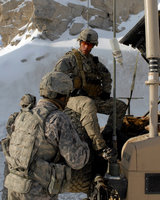National security types have long noted -- and complained about -- the relative lack of military veterans in Congress, which results in too few experienced votes being cast when the prospect of overseas interventions is raised. I have long noted -- and complained about -- the fact that Congress' most prominent military vets hail from the Vietnam era, which has led many to instinctively reject the necessity and utility of conducting nation-building and counterinsurgency. Clearly, our lengthy interventions in Iraq and Afghanistan will alter this generational equation, but how will the experiences of today's veterans impact their votes in tomorrow's Congress?
Luke S. Larson's new book, "Senator's Son: An Iraq War Novel," attempts to answer that question. Forget the weak crisis scenario he offers in the flash-forwards that dot this here-and-now novel. (No great powers will be clashing over oil reserves in 2047, because oil just won't be that important come mid-century.) Instead, concentrate on the terrific way in which this former Marine infantry officer captures the day-to-day challenges facing platoon leaders in Ramadi just prior to and then during the "surge" period in which counterinsurgency logic was finally -- and seriously -- re-embraced by the U.S. military.
Whether we're talking about the Marines or the Senate, the future scenarios matter much less than the institutional confidence factor, and in many ways will be determined by them. An America with no illusions about -- and plenty of real-world experience in -- nation-building will be a military power whose word is taken seriously during crises in the decades ahead. When faced with rhetoric and threats from fellow great powers concerning potential interventions in smaller, weaker and/or failing states, we'll not only know what we're talking about, we'll also have the institutional capabilities to back it up -- while they most likely will not.

